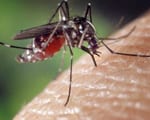“And so, for the first time in the history of mankind, and this looks like a one-time thing, flopping is being dissected like a laboratory frog.” — Shaun Powell

Sports on Earth journalist Shaun Powell covered the research of SMU biomechanics expert Peter G. Weyand, who is teaming with Dallas Mavericks owner Mark Cuban to investigate the forces involved in basketball collisions and the possibility of estimating “flopping” forces from video data.
The coverage, “The science of the flop,” was published Dec. 13.
Flopping is a player’s deliberate act of falling, or recoiling unnecessarily from a nearby opponent, to deceive game officials. Athletes engage in dramatic flopping to create the illusion of illegal contact, hoping to bait officials into calling undeserved fouls on opponents.
The phenomenon is considered a widespread problem in professional basketball and soccer. To discourage the practice, the National Basketball Association in 2012 began a system of escalating fines against NBA players suspected of flopping.
The Cuban-owned company Radical Hoops Ltd. awarded a grant of more than $100,000 to fund the 18-month research study at SMU. Weyand is associate professor and director of the SMU Locomotor Performance Laboratory at the Annette Caldwell Simmons School of Education and Human Development.
EXCERPT:
By Shaun Powell
Sports on Earth
Billionaires are different than the rest of us. They have money to burn, and in the case of Mavericks owner Mark Cuban, money to learn. In the past year Cuban shelled out 100 large to fund a scientific study on flopping in the NBA, just because he was smitten by players faking fouls, so in this case you might argue his money is both burning and learning.Seriously, now: A hundred grand to understand the complexities and biomechanical execution from the combustible result of forceful contact between a moving mass of human flesh and a stationary being, and whether a healthy degree of chicanery and tomfoolery is being utilized to trigger a favorable response from an impartial and faulty bystander with a whistle, who must make a snap judgment based on the electrodes produced by his eyes?
All for that?
Well.
Maybe in the past, when he was a bit new to the NBA ownership game, Cuban mishandled a buck or two. Paying millions to Erick Dampier and Shawn Bradley, 14 feet worth of stiff centers, immediately comes to mind. Hey, we’ve all thrown away money before, mainly on a cheap pair of socks that sprouted holes after three washings; it’s all relative. But Cuban has a better grip now, and has always been a brilliant and cutting-edge guy, and is even richer than ever, so why not part ways with 1/500,000,000 (or so) of your net worth to get to the bottom of an act that’s the scourge of the NBA? How can anyone insist, for one second, this isn’t money well spent?
And so, for the first time in the history of mankind, and this looks like a one-time thing, flopping is being dissected like a laboratory frog (who, by the way, does a fair amount of flopping once he’s violently sliced by a scalpel). It’s happening inside a nondescript building just off the Southern Methodist University campus, and being conducted by Peter Weyand, an associate professor for applied physiology and biomechanics. But for this particular study, we’ll just call him the Professor of Flopology.
“This is unexplored territory,” he said. “There’s little to no information on how much force it takes to knock someone off balance, and how much someone can control their resistance. Most of the balance research is done on the elderly, not young and healthy people.”
Weyand was a bit surprised to get an email from Cuban a little more than a year ago, asking if the he’d have any interest in conducting a study. Weyand once played collegiately at Bates College where, he said — and he swears — he never flopped. Not once.
“Not to my recollection, although that was a long time ago,” he added.
Weyand discovered no study had ever been done on flopping — what a surprise — and saw it as an opportunity for ground-breaking research on what is a good foul and what’s a fake, and the merits of force.
SMU is a nationally ranked private university in Dallas founded 100 years ago. Today, SMU enrolls nearly 11,000 students who benefit from the academic opportunities and international reach of seven degree-granting schools. For more information see www.smu.edu.
SMU has an uplink facility located on campus for live TV, radio, or online interviews. To speak with an SMU expert or book an SMU guest in the studio, call SMU News & Communications at 214-768-7650.


 Gut reaction of marital partners could foretell their marriage satisfaction
Gut reaction of marital partners could foretell their marriage satisfaction Fossil supervolcano discovered in Italy by SMU-led team is now key feature of new UNESCO Geopark
Fossil supervolcano discovered in Italy by SMU-led team is now key feature of new UNESCO Geopark NPR: “Boiling Hot: How Fracking’s Gusher of Geothermal Energy is Wasted”
NPR: “Boiling Hot: How Fracking’s Gusher of Geothermal Energy is Wasted” KERA, NOVA: SMU researcher Peter Weyand discusses the upper limits of human speed.
KERA, NOVA: SMU researcher Peter Weyand discusses the upper limits of human speed.  The Undying Radio: Familiarity breeds content when it comes to listeners and music
The Undying Radio: Familiarity breeds content when it comes to listeners and music Mosquito indexing system identifies best time to act against potential West Nile Virus outbreaks
Mosquito indexing system identifies best time to act against potential West Nile Virus outbreaks Sweden, SMU psychologists partner to launch parenting program that reduces child abuse
Sweden, SMU psychologists partner to launch parenting program that reduces child abuse